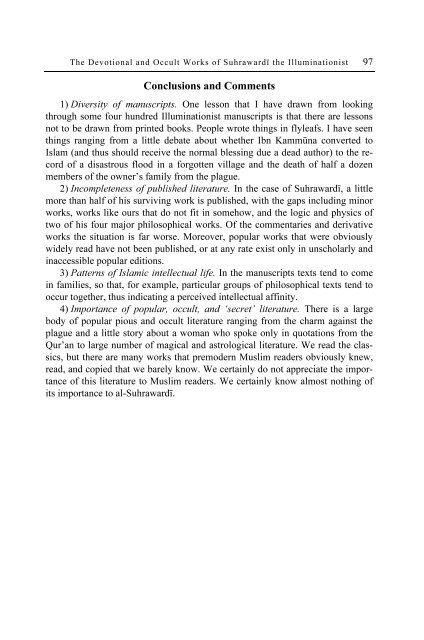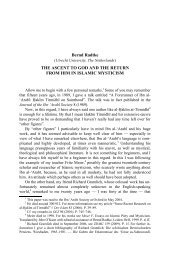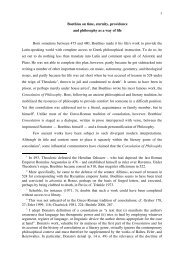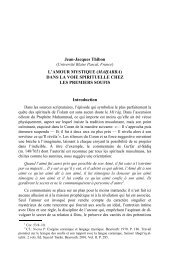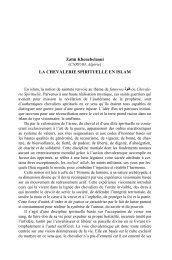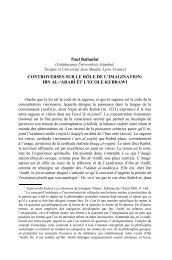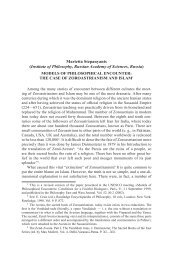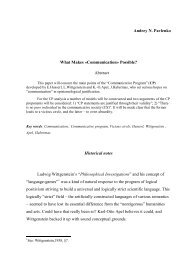The Devotional and Occult Works of Suhrawardī the Illuminationist
The Devotional and Occult Works of Suhrawardī the Illuminationist
The Devotional and Occult Works of Suhrawardī the Illuminationist
You also want an ePaper? Increase the reach of your titles
YUMPU automatically turns print PDFs into web optimized ePapers that Google loves.
<strong>The</strong> <strong>Devotional</strong> <strong>and</strong> <strong>Occult</strong> <strong>Works</strong> <strong>of</strong> <strong>Suhrawardī</strong> <strong>the</strong> <strong>Illuminationist</strong> 97<br />
Conclusions <strong>and</strong> Comments<br />
1) Diversity <strong>of</strong> manuscripts. One lesson that I have drawn from looking<br />
through some four hundred <strong>Illuminationist</strong> manuscripts is that <strong>the</strong>re are lessons<br />
not to be drawn from printed books. People wrote things in flyleafs. I have seen<br />
things ranging from a little debate about whe<strong>the</strong>r Ibn Kammūna converted to<br />
Islam (<strong>and</strong> thus should receive <strong>the</strong> normal blessing due a dead author) to <strong>the</strong> record<br />
<strong>of</strong> a disastrous flood in a forgotten village <strong>and</strong> <strong>the</strong> death <strong>of</strong> half a dozen<br />
members <strong>of</strong> <strong>the</strong> owner’s family from <strong>the</strong> plague.<br />
2) Incompleteness <strong>of</strong> published literature. In <strong>the</strong> case <strong>of</strong> <strong>Suhrawardī</strong>, a little<br />
more than half <strong>of</strong> his surviving work is published, with <strong>the</strong> gaps including minor<br />
works, works like ours that do not fit in somehow, <strong>and</strong> <strong>the</strong> logic <strong>and</strong> physics <strong>of</strong><br />
two <strong>of</strong> his four major philosophical works. Of <strong>the</strong> commentaries <strong>and</strong> derivative<br />
works <strong>the</strong> situation is far worse. Moreover, popular works that were obviously<br />
widely read have not been published, or at any rate exist only in unscholarly <strong>and</strong><br />
inaccessible popular editions.<br />
3) Patterns <strong>of</strong> Islamic intellectual life. In <strong>the</strong> manuscripts texts tend to come<br />
in families, so that, for example, particular groups <strong>of</strong> philosophical texts tend to<br />
occur toge<strong>the</strong>r, thus indicating a perceived intellectual affinity.<br />
4) Importance <strong>of</strong> popular, occult, <strong>and</strong> ‘secret’ literature. <strong>The</strong>re is a large<br />
body <strong>of</strong> popular pious <strong>and</strong> occult literature ranging from <strong>the</strong> charm against <strong>the</strong><br />
plague <strong>and</strong> a little story about a woman who spoke only in quotations from <strong>the</strong><br />
Qur’an to large number <strong>of</strong> magical <strong>and</strong> astrological literature. We read <strong>the</strong> classics,<br />
but <strong>the</strong>re are many works that premodern Muslim readers obviously knew,<br />
read, <strong>and</strong> copied that we barely know. We certainly do not appreciate <strong>the</strong> importance<br />
<strong>of</strong> this literature to Muslim readers. We certainly know almost nothing <strong>of</strong><br />
its importance to al-<strong>Suhrawardī</strong>.


